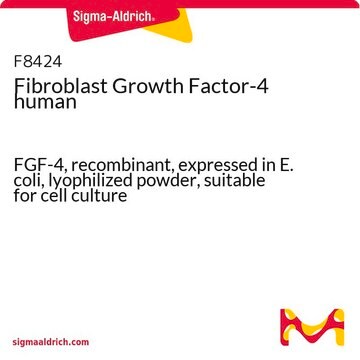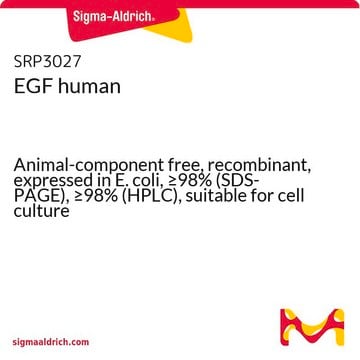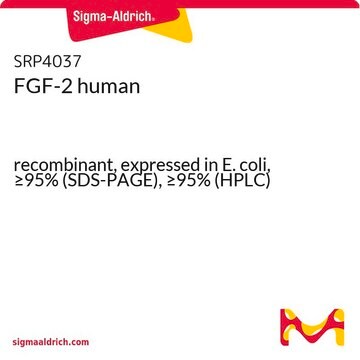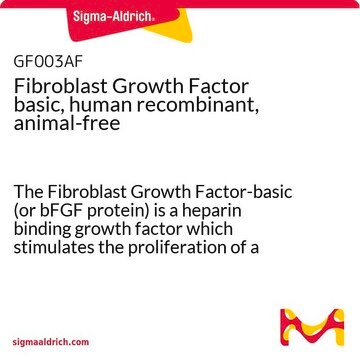SRP3261
FGF-4 human
Animal-component free, recombinant, expressed in E. coli, ≥95% (SDS-PAGE), ≥95% (HPLC)
Synonym(s):
HBGF-4, HST-1, transforming protein KS3
Sign Into View Organizational & Contract Pricing
All Photos(1)
About This Item
UNSPSC Code:
12352202
NACRES:
NA.32
Recommended Products
biological source
human
recombinant
expressed in E. coli
assay
≥95% (HPLC)
≥95% (SDS-PAGE)
form
lyophilized
potency
≥0.5 ng/mL
mol wt
19.7 kDa
packaging
pkg of 25 μg
impurities
<0.1 EU/μg endotoxin, tested
color
white to off-white
UniProt accession no.
shipped in
wet ice
storage temp.
−20°C
Gene Information
human ... FGF4(2249)
General description
The FGF4 (fibroblast growth factor 4) gene is mapped to human chromosome 11q13.3. It is expressed during early embryonic development. In adults, it is strongly expressed in the testis. The encoded protein mainly interacts with FGFR1c (FGF receptor 1c) and FGFR2c. It also binds to FGFR3c and FGFR4, but to a lesser extent.
application
- FGF-4 human has been used to study the effect of FGF4 on the differentiation of PDMCs (placenta-derived multipotent cells) into hepatocyte-like cells.
- It has been used as a growth factor to study the proliferation and differentiation of human bone marrow mesenchymal stem cells (hMSCs) to chondrocytes.
- It has been used to study hepatic differentiation.
Biochem/physiol Actions
FGF4 (fibroblast growth factor 4) was first identified as an oncogene transforming NIH3T3 (mouse embryo fibroblast cell line) cells. It helps in maintaining the self-renewal capability of normal stem cells (for instance, trophoblastic stem cells). It is also required for cellular differentiation, morphogenesis and proliferation. It controls proliferation and differentiation of normal stem cells, progenitor cells and cancer cells.
Physical form
Lyophilized from 10 mM Sodium Phosphate, pH 7.6 + 100 mM NaCl.
Reconstitution
Centrifuge the vial prior to opening. Reconstitute in water to a concentration of 0.1-1.0 mg/mL. Do not vortex. This solution can be stored at 2-8°C for up to 1 week. For extended storage, it is recommended to further dilute in a buffer containing a carrier protein (example 0.1% BSA) and store in working aliquots at -20°C to -80°C.
Storage Class
10 - Combustible liquids
wgk_germany
WGK 3
flash_point_f
Not applicable
flash_point_c
Not applicable
Choose from one of the most recent versions:
Certificates of Analysis (COA)
Lot/Batch Number
Don't see the Right Version?
If you require a particular version, you can look up a specific certificate by the Lot or Batch number.
Already Own This Product?
Find documentation for the products that you have recently purchased in the Document Library.
Isolation and characterization of epithelial progenitor cells from human fetal liver.
Liu YN, et al.
Hepatology Research : the Official Journal of the Japan Society of Hepatology, 38, 103-103 (2008)
Increased FGF3 and FGF4 gene dosage is a risk factor for craniosynostosis.
Grillo L, et al.
Gene, 534, 435-435 (2014)
Fibroblasts induce expression of FGF4 in ovarian cancer stem-like cells/cancer-initiating cells and upregulate their tumor initiation capacity.
Yasuda K, et al.
Laboratory Investigation; a Journal of Technical Methods and Pathology, 94, 1355-1355 (2014)
Chondrogenic induction of human mesenchymal stem cells using combined growth factors for cartilage tissue engineering.
Bosetti M, et al.
Journal of Tissue Engineering and Regenerative Medicine, 6, 205-205 (2012)
Eryn Wicklow et al.
PLoS genetics, 10(10), e1004618-e1004618 (2014-10-24)
Pluripotent epiblast (EPI) cells, present in the inner cell mass (ICM) of the mouse blastocyst, are progenitors of both embryonic stem (ES) cells and the fetus. Discovering how pluripotency genes regulate cell fate decisions in the blastocyst provides a valuable
Our team of scientists has experience in all areas of research including Life Science, Material Science, Chemical Synthesis, Chromatography, Analytical and many others.
Contact Technical Service








